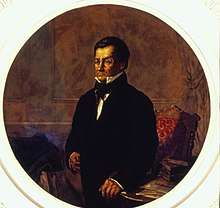Diogo Antônio Feijó
Diogo Antônio Feijó (10 August 1784 – 10 November 1843) was a Brazilian politician and catholic priest. He was the Regent of the Empire of Brazil from October 1835 to September 1837. Beside members of the Imperial family, he was the first to ever hold this position alone; the other was his appointed successor after his resignation, the Marquis of Olinda. Both were regents at the time Emperor Dom Pedro II was still a minor.
Diogo Antônio Feijó | |
|---|---|
 | |
| Personal details | |
| Born | 10 August 1784 São Paulo, Empire of Brazil |
| Died | 10 November 1843 (aged 59) São Paulo, Empire of Brazil |
Biography
He received his early education in a clerical college of São Paulo. In 1807 he was ordained priest, and soon afterward began to teach in Parahyba.
In 1820 the constitutional revolution triumphed in Portugal, and Feijó was sent as a representative from the province of São Paulo to the Portuguese assembly (Portuguese: Cortes) in Lisbon,[1] to which he was admitted 11 February 1822. On 25 April, he made an eloquent speech in defense of Brazilian rights, which were threatened by the Portuguese majority. The Brazilian deputies were unsuccessful, and Feijó, with five others, left Lisboa secretly for Falmouth, where, on 22 October 1822, they published a manifesto explaining their conduct. Feijó afterward returned to Brazil, and retired to Itu.
In 1824 Dom Pedro I submitted a proposed constitution to the municipalities of the empire, which was almost unanimously accepted, except at Itu, where Feijó proposed to amend it. The province of São Paulo elected him successively to the legislatures of 1826-29 and 1830-33. In 1827 he proposed the abolition of clerical celibacy, and in 1828 submitted a project for the reform of municipalities.
In 1831 Feijo was appointed by the regency minister of justice, and in this capacity dissolved undisciplined military bodies, checked on 7 October 1831 the revolution in the Ilha das Cobras, organized on 10 October a body of military police, and in 1832 suppressed another revolt. In 1833 he was appointed life senator, and in 1834 the electors of the empire made him regent of Brazil. On the day previous to his election as regent, he had been appointed bishop of Marianna, but had declined the dignity for political reasons.
He took office as regent on 12 October 1835.[2] As regent, he proclaimed liberal and progressive measures, but his policy met with such opposition from the conservatives that he resigned his office on 18 September 1837, retired to São Paulo, and did not appear in the Senate again until 1838. He served as the President of the Senate from 1839 to 1840.[3]
In 1842, he edited a political paper called O Justiciero. In the same year a revolution broke out near Campinas, where Feijo was staying, and, although enfeebled by age and sickness, he took upon himself the responsibility of the movement, and, being defeated, was arrested, taken to Santos, and thence to Rio de Janeiro, to be tried by the Senate. He succeeded in explaining his conduct before that body, and this proved to be the last act of his political life, for he died soon afterward.
Notes
- Rines, George Edwin, ed. (1920). . Encyclopedia Americana.
- Gilman, D. C.; Peck, H. T.; Colby, F. M., eds. (1905). . New International Encyclopedia (1st ed.). New York: Dodd, Mead.
- "Império (1826-1889) - Senado Federal". www25.senado.leg.br.
References
- This article incorporates text from a publication now in the public domain: Wilson, J. G.; Fiske, J., eds. (1900). . Appletons' Cyclopædia of American Biography. New York: D. Appleton.